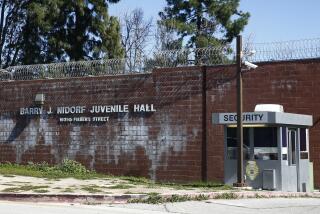JUVENILE JUSTICE : Payback Project Teaches Responsibility to Youths
- Share via
PALM BAY, Fla. — A year and a half after her daughter was caught wrecking a house, Judy Noxon says: “She’s not like she used to be. She was held responsible. And it smartened her up.”
Kristy Cooper was 13 and on her way to a criminal record after she and two friends trashed an empty house in a prank gone awry. After the court assessed the teen-ager $133 in damages, Noxon refused to bail her daughter out of trouble.
Instead, she sent Kristy to Project Payback, an innovative restitution program for nonviolent juvenile delinquents run by the Brevard County prosecutor’s office in cooperation with the state’s Department of Health and Rehabilitative Services and the Private Industry Council.
Project Payback found Kristy a part-time job at a local print shop so she could earn the $133. “I was lucky,” said the teen-ager, now 15 and a ninth-grader in this fast-growing central Florida city. “This has helped me learn a lot of stuff about growing up.”
Funded with a $76,000 grant from the U.S. Justice Department, Project Payback is the first such program in Florida and potentially a national model of alternative responses to juvenile crime. The program allows first-time offenders between 12 and 17 to avoid a criminal record while learning job skills and responsibility.
“With the juvenile crime rate skyrocketing, we are looking for ways to cut back on recidivism,” said State Atty. Norm Wolfinger. “This is no different than in the home. Unless children are held accountable for what they do, they are not going to change their behavior.
“Restitution is the key. This gets their attention. We feel confident we’re going to see results.”
Since Project Payback was launched six months ago, 481 juvenile offenders have been screened for admission and 57 have been accepted. Wolfinger’s office checks with school boards and local police departments to determine eligibility.
After completing a required 4 1/2-hour course in work ethics, the teen-agers are placed with volunteer employers--banks, print shops, auto body shops, motels, for example--until their debt is paid, said Debbie Davis, Project Payback’s project coordinator.
“Every Chamber of Commerce in Brevard County is a partner in this, so finding jobs has not been difficult,” Davis said.
Davis has heard criticism that Project Payback seems to reward delinquents by serving as a job-placement agency. “No, we are not finding good jobs for bad kids,” she declared. “This is not a permanent position. The job is simply for payback purposes. And they are learning something useful.”
Kristy, working for the minimum wage of $4.25 an hour, set aside 75% of each paycheck to work off her debt and kept 25%. She has completed her restitution and earned the respect of her boss at All Service Graphics Inc., where owner Don Gust said that she saved the company several hundred dollars her first day on the job. “Working in the bindery, she spotted a typo and we redid the job,” he said. “We saved money and some face.”
For Noxon, Kristy’s mother, Project Payback has succeeded in several ways. Not only did her daughter learn to accept responsibility for her actions, she said, but she also came to appreciate the reality of the working world.
“She would come home from her job and tell me: ‘Now I know how you feel, having to come home and do chores here.’ She has grown up quite a bit.”
More to Read
Sign up for Essential California
The most important California stories and recommendations in your inbox every morning.
You may occasionally receive promotional content from the Los Angeles Times.













